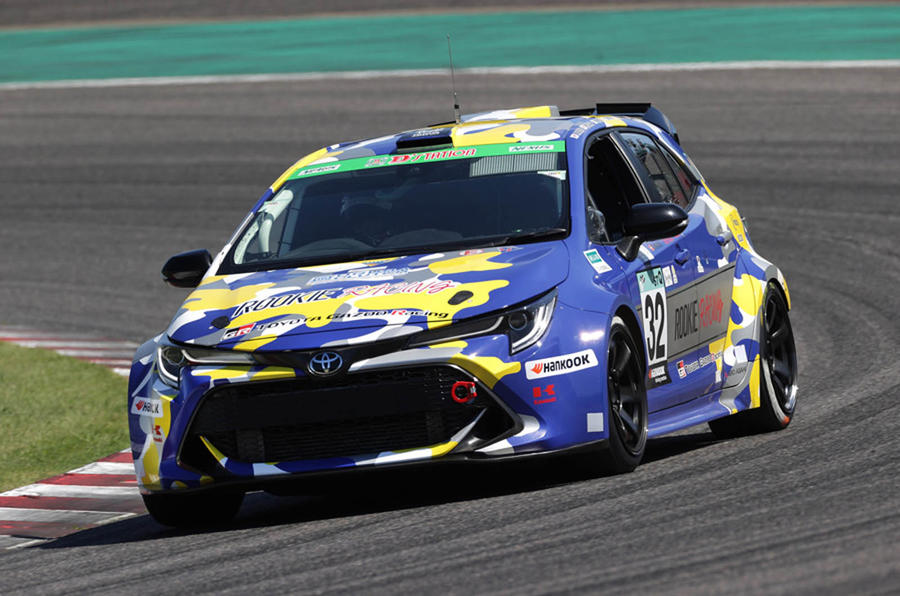Five of Japan's largest vehicle manufacturers - Subaru, Toyota, Mazda, Kawasaki and Yamaha - have jointly detailed a plan to safeguard the future of the internal combustion engine.
Speaking together at the Super Taikyu Race in Okayama earlier this week, representatives from each of the firms vowed to collaborate on "expanding fuel options" using existing ICE technology, bucking a wider industry trend towards full electrification.
The companies "intend to unite and pursue the three initiatives of participating in races using carbon-neutral fuels; exploring the use of hydrogen engines in two-wheeled and other vehicles; and continuing to race using hydrogen engines."
They plan to continue on a trajectory towards collective carbon neutrality, as part of which they will continue to invest in electrification. But they will also seek to collaborate "in producing, transporting and using fuel in combination with internal combustion engines", as part of a drive to give customers greater choice.
Toyota's efforts in this area, particularly, are well documented. The company is already using a lightly modified Corolla race car to determine the viability of hydrogen-combustion technology, which, it says, would reduce the emissions of its vehicles without disregarding the several decades it has invested in developing its existing petrol and diesel engines.
Now, as part of this new joint initiative, Toyota will expand its existing partnership with Subaru to test 'carbon-neutral' synthetic fuels in a race environment. Next year, Subaru and Toyota will enter a BRZ and GR 86, respectively, into Japan's Super Taikyu race series (in which the hydrogen-combustion Corolla currently races) using synthetic fuel derived from biomass.
The two car makers already have an EV development partnership in place and recently revealed their respective debut EVs: the technically identical Toyota bZ4X and Subaru Solterra. This latest element of the collaboration will see them attempt to "accelerate the development of technologies for all options and take on the challenge of achieving carbon neutrality."
Their synthetically fuelled entries will be joined on the grid in 2022 by an experimental racer from Mazda, based on its Mazda 2 supermini. Using a specially adapted version of the firm's 1.5-litre Skyactiv-D diesel engine, it runs on biodiesel derived entirely from biomass.
Mazda will use the race series to test and improve the reliability of its biodiesel-fuelled engine with a view to encouraging "the expansion of the use of next-generation biodiesel fuel". The fuel itself is made from cooking oil and fats, which, Mazda said, means it does not compete with the human food supply. Notably, it does not require any modification to the standard engine, nor require any bespoke infrastructure to be implemented.












Join the debate
Add your comment
Hydrogen cars in Europe makes little sense. The only way to make green hydrogen is through using electricity and you end consuming 4 to 5 times as much electricity to go the same distance plus burn hydrogen in air and it produces oxides of nitrogen.
Save hydrogen for long haul usage like trucks and boats. Synthetic fuels have a problem. They either consume a lot of electricity or a lot of crop usage and we need to consider that impact.
Long story short, stop using fossil fuels, embrace electric cars, build fewer cars drive less.
It really does not make sense to make cars which cover a small lifetime distance with EV powertrains. The recent Volvo study suggested that a car needs to travel a great distance (far more than many low mileage cars ever will) before the CO2 debt from making their batteries is recovered. It is VERY likely that an EV Ferrari, Aston Martin etc would have a greater lifetime CO2 footprint than an ICE version, and if that ICE CO2 footprint can be reduced further with biofuels, why not. Furthermore these types of cars often have much longer lifetimes than bread and butter cars, and we still dont know if an EV battery will work for 30, 50 years into the future.
The Japanese proposal is not about abandoning EVs, just not 100% adopting them. There are many good reasons for this, and I am pleased they are not just following the flock (of sheep)
Would these companies look at what Porsche are doing with synthetic fuels with their plant in Chile for example. ICE still has a long life ahead no matter what Politicians believe.